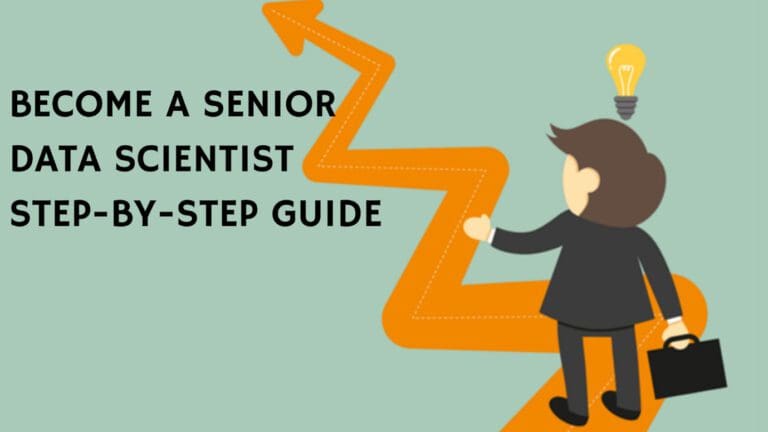With the demand for professionals with advanced technical skills growing daily, it’s more important than ever to stay up to date on what it takes to move from intermediate-level proficiency to expertise.
In this blog post, I will provide a step-by-step guide on how to become a senior data scientist. From developing strong theoretical foundations through tackling complex projects – with key focus areas outlined and essential tips provided along the way – by following these steps you can be well on your way towards establishing yourself as an industry leader.
UNDERSTAND THE FUNDAMENTAL DATA SCIENCE CONCEPTS AND HOW THEY RELATE TO EACH OTHER
In the age of data, understanding fundamental data science concepts is crucial. Data science is an interdisciplinary field that extracts knowledge and insights from data. The foundation of data science is built upon various mathematical, statistical, and computer science concepts. For instance, probability plays a significant role in understanding data distribution, while statistical methods allow us to draw insights from data.
At the same time, computer science tools and technologies aid in handling and analyzing large datasets. Understanding how these concepts relate to each other is essential in becoming a competent data scientist. Therefore, it is necessary to be well-versed in the foundational concepts of data science to excel in this field.
DEVELOP YOUR SKILLS IN DATA ANALYTICS, MACHINE LEARNING, AND ARTIFICIAL INTELLIGENCE
Industries continue to evolve in today’s digital age, it’s becoming increasingly important to have a solid understanding of data analytics, machine learning, and artificial intelligence. Developing these data scientist skills can provide new opportunities for career growth and business success.
Data analytics can provide insights on customer behavior and market trends while machine learning powers innovative technologies such as self-driving cars and chatbots. Artificial intelligence can automate tedious tasks and improve efficiency. By investing in developing your skills in these areas, you’re investing in a brighter and more lucrative future.
OBTAIN CERTIFICATIONS THAT DEMONSTRATE YOUR KNOWLEDGE IN DATA SCIENCE
In today’s data-driven world, obtaining certifications in data science has become essential for professionals looking to advance their careers. These certifications demonstrate a deep understanding of data science principles and techniques, making individuals more valuable to their employers.
In addition to providing a competitive edge, obtaining certifications can also increase earning potential and offer opportunities for career growth. With so many different certifications available, it’s important to carefully choose the ones that align with your specific career goals and interests. By investing in data scientist certification, individuals can position themselves for success in this rapidly evolving field.
BUILD A PROFESSIONAL PORTFOLIO THAT SHOWCASES YOUR PROJECTS AND EXPERIENCE
As professionals, we know how important it is to showcase our skills and expertise through a well-crafted portfolio. A standout portfolio can help us stand out in a crowded job market and highlight our unique strengths to potential clients or employers. When building a portfolio, it’s important to consider not just the projects we’ve worked on, but also the experience we’ve gained along the way.
Our portfolio should reflect our career journey and highlight the skills we’ve acquired through our endeavors. With careful attention to detail and a professional tone, we can create a portfolio that not only impresses but also inspires others to pursue their own professional goals.
NETWORK WITH OTHER DATA SCIENTISTS WITHIN YOUR FIELD
In the rapidly growing field of data science, networking with other professionals in your field is crucial for staying up to date with the latest trends and technologies. Connecting with fellow data scientists can lead to new job opportunities, collaborations on projects, and valuable insights into the industry.
By attending industry events, joining professional organizations, and engaging with peers on social media, you can build a strong network of like-minded individuals who can support your career advancement. In addition, networking can expand your knowledge of the industry and help you identify new areas of interest within the field of data science. As a data scientist, establishing and nurturing professional relationships should be a top priority for long-term growth and success.
LEARN ABOUT THE MOST COMMON TOOLS USED FOR ANALYZING AND INTERPRETING DATA
In today’s data-driven world, the ability to analyze and interpret data is more important than ever. However, with so many different tools available, it can be overwhelming to determine which ones are the most effective. Fortunately, there are some common tools that data analysts swear by.
These tools include statistical software like R and Python, data visualization tools such as Tableau and Power BI, and database management tools such as SQL. By utilizing these powerful tools, data analysts can quickly identify patterns and trends in their data, enabling them to make more informed decisions and drive business success.
CONCLUSION
Data science is an ever-evolving field that requires a diverse set of skills and knowledge. Aspiring data scientists should have a solid understanding of fundamental concepts and be able to develop competency in related fields such as analytics and machine learning. In addition, demonstrating one’s understanding with certifications is recommended to increase the chances of career success.
Building a portfolio that demonstrates your work as well as networking with other data scientists within your industry are great strategies to gain experience in the field of data science. Lastly, familiarizing yourself with the most used tools for analyzing and interpreting data is essential for achieving success as a data scientist. With consistency and dedication, those looking to pursue a career in data science can certainly obtain their senior data scientist certification—and be on the right path to becoming leading experts in the field.
ABOUT THE AUTHOR

My name is Emily Joe, a data science professional and Freelance blogger, looking forward to connecting with you via data science, AI-related content. Thanks!








